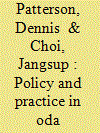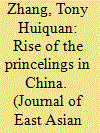|
|
|
Sort Order |
|
|
|
Items / Page
|
|
|
|
|
|
|
| Srl | Item |
| 1 |
ID:
167833


|
|
|
|
|
| Summary/Abstract |
The absence of class voting or the existence of “reverse” class voting under rising inequality remains a puzzling question in South Korea. While poor voters seem to support conservative candidates more than the rich do, this is due to a confounding effect of age, because poverty is concentrated among the elderly in Korea. Using the Korean General Social Survey data (KGSS 2004–2014) covering two presidential elections, two general legislative elections, and two nationwide local elections, we find that Koreans, in particular the poor electorate, engage in class voting in both objective and subjective terms. While regional and generational cleavages continue to be the most important determinants of partisan competition, class by income levels as well as subjective identity significantly impact vote choice when age is adequately controlled for.
|
|
|
|
|
|
|
|
|
|
|
|
|
|
|
|
| 2 |
ID:
167835


|
|
|
|
|
| Summary/Abstract |
South Korea is the only nation to become an important donor nation after being a recipient of Official Development Assistance (ODA) for several decades. In 2010, it became a member of the OECD's Development Assistance Committee, and while it has continued to use its experience as a former ODA recipient to inform its distribution practices, it also has evolved its ODA policies in response to changes in international norms and the imperatives associated with being a DAC-member nation. We know that, while policies may change, actual ODA disbursements—which nations are selected as recipients and receive ODA in what amounts—may lag or even remain unchanged. In this paper, we use the case of South Korea to determine how actual ODA disbursements change in response to policy changes. To accomplish this, we use a selection model to conduct a statistical analysis of South Korea's ODA disbursements using dyadic data from 1987 to 2016. Our results indicate that, while there has been continuity in terms of which nations receive South Korean ODA, there were also notable changes in its disbursements. Specifically, the ODA policy changes the South Korean government enacted did result in an altered profile of nations that were targeted by South Korea as ODA recipients.
|
|
|
|
|
|
|
|
|
|
|
|
|
|
|
|
| 3 |
ID:
167834


|
|
|
|
|
| Summary/Abstract |
Past studies suggest that domestic public support for compliance with international human rights law can constrain governments to comply with human rights law. But the question remains: Why does the public care about compliance? Using a series of survey experiments in South Korea and the United States, this study finds that constituents are concerned about compliance in one issue area—such as human rights—because they believe it will affect the country's reputation in other domains of international law. Cross-national survey experiments demonstrate that past noncompliance negatively affects the South Korean public's second-order beliefs about the likelihood of future compliance across different issue areas. However, past noncompliance has a limited impact on the US public's first-order beliefs across different domains.
|
|
|
|
|
|
|
|
|
|
|
|
|
|
|
|
| 4 |
ID:
167832


|
|
|
|
|
| Summary/Abstract |
How have China's princelings benefitted from their family backgrounds in their careers? This study seeks to answer the question and, in so doing, to add to the existing factionalist and meritocracy approaches to Chinese political elites. Based on biographical data of 293 princelings, quantitative analyses show that princelings have various advantages over non-princeling officials on the Central Committee. This is not simply familial advantage, however, as regression analysis finds parents’ rank and longevity do not significantly affect princelings’ career outcomes. Rather, the findings suggest that princelings benefit from membership in an affiliative status group, which differs from factions. The qualitative analysis find princelings’ status is formed and reproduced in a “collective” manner: (1) princelings’ status and early advantages originated in the state's centralized resource allocation system; (2) princelings’ education and career choices are intertwined with the state's practical and ideological goals; (3) princelings’ shared life courses strengthens their collective identity; (4) princelings’ career advantages are secured by the party-state's cadre management system. These factors combine to reproduce princelings’ elite status within the party and state, what I term “collective elite reproduction.”
|
|
|
|
|
|
|
|
|
|
|
|
|
|
|
|
| 5 |
ID:
167831


|
|
|
|
|
| Summary/Abstract |
Does foreign direct investment (FDI) promote or hinder good governance in a host state? In this article, I analyze the effects of FDI on subnational-level corruption across 63 provinces in Vietnam and find that FDI has both promoted and hindered control of corruption. Initially, FDI creates resources and incentives to improve governance and reduce corruption for early winner provinces. Yet, once FDI begins to pour in, different dynamics start to take effect. While the resources and incentives accrued to FDI-recipient provinces become less effective in further curbing corruption as more FDI flows in, FDI provides leaders of those provinces with growing opportunities and increased abilities to seek and pursue rents, leading to a prevalence of corruption. Using both qualitative and quantitative data, I find strong evidence that the control of corruption is weakest at the extremes: in provinces with the least and the most FDI.
|
|
|
|
|
|
|
|
|
|
|
|
|
|
|
|
|
|
|
|
|